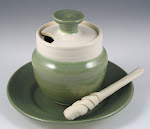Struck as ever by the wonderful freshness from the hands of long-gone craftspeople, the artists of their times, I was also struck by a particular dichotomy. Ornate and expensively colored objects were for the rich, of course, yet these things tended toward utility for milennia. In the medium of clay, only religious objects, and objects reflecting long held traditions or recounting daily activities, or deeply functional objects were made. Today, objects made of clay can be pure decoration or pure self expression. Yet these older things resonated within my imagination, with their brilliant craftsmanship and assertiveness.
Within the framework of functional clay, imagination lent sway. Spouts of pouring vessels became, say, the beaks of birds. Bowls and drinking vessels might be incised with flowers, birds and vines, and inlaid with colors before firing. Workmanship was breathtaking and at its freshest, representing a range of influences from the natural world in form and decoration.
Forms sparked my imagination. A small bowl atop a high-footed saucer was like a simple lotus center on a many-lobed open leaf. One small thing like that- moved me!
In an tiny exhibition of Japanese ceramics 1930-2000, I saw a Shoji Hamada tall teapot, potted thinly from fairly coarse clay, not like the pieces on somewhat smoother clay with his strong, famous brushwork that I am used to seeing in books, but rather a soft and a little droopy shape. Very pleasingly showing the marks of the master (Japanese National Treasure) that Hamada was, this teapot was like a very fine, upright shar-pei dog, ever so friendly and a bit slumpy looking. I could see that Hamada had been happy with it! Like the older vessels, this modern one was all about usefulness, and also like them, encapsulated the obvious vitality of the hands of the maker.
Works in clay! How varied they can be! The day before, we had stopped at Colonial Williamsburg, Virginia. Among the noteworthy and large collection of American folk art at The Abby Aldrich Rockefeller Folk Art Museum there, we found surprising exhibition notes along the railings that were porcelain pages of children's book drawings. What a wonderful idea! There are so many ways to set up notes for a display. These got me thinking about my children's book illustrations from a decade ago (for a book that did not get picked up by a publisher), and I wonder whether I should make wall art out of them instead of written narration on paper or e-book!
 |
| porcelain children's book pages as exhibition notes |


No comments:
Post a Comment